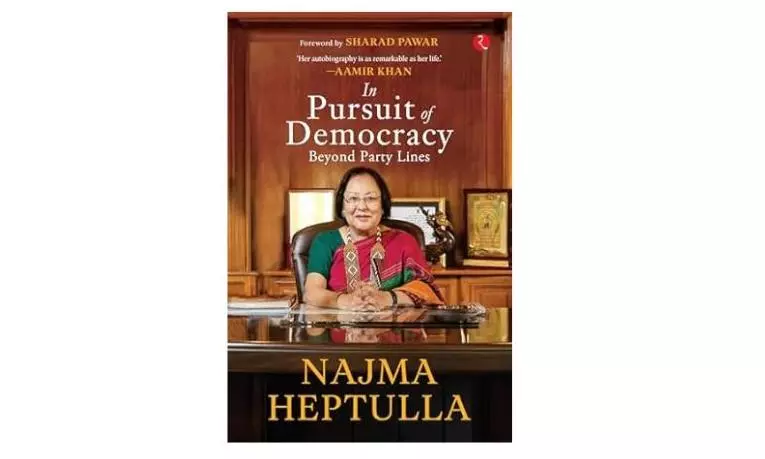Book Review | Indira’s friend, Sonia’s bete noire

What stands out conspicuously is that she belonged to an educated, cultured family on her father’s and mother’s side — Maulana Azad is her maternal grandmother’s brother — which settled in Bhopal, and she married into a well-off Bohra Shia family in Bombay, now Mumbai. She rightly says that her political engagement began when she worked in the slums of Golibar, Khetwadi and Jogeshwari. But then that is not how political careers are made in India. You have to belong to a political party, and work your way up the ladder. Najma Heptulla entered the Congress political circle laterally, through her friendship with Indira Gandhi, which goes back to Jawaharlal Nehru. Because she was the grandniece of Azad, Nehru took a benign interest in her academic progress.
Najma was a science student with a doctorate and post-doctoral work. She took keen interest in environment, and was closely associated with the Indo-Arab Friendship Society. Perhaps because her great-grandfather and his father had lived in Mecca for years. But this cultivated interest in West Asia in a way worked as her calling card to be a valued entrant to the Indira Gandhi circle. There was also fact that her husband Akbar Ali Adamji Heptulla had friends in Bombay in the political and literary circles, including Aruna Asaf Ali. In spite of all these connections and her family background, she was not the traditional Congress politician, and she did not become one. So, the line in the title of the book, Beyond Party Lines, has a genuine ring to it.
What seems to have sustained her in the Congress and her meteoric rise in the party hierarchy was her personal bonding with Indira Gandhi. Heptulla is quite unabashed about her admiration for Indira Gandhi. She writes: “She had once told me why she was fond of me: ‘I like women who are educated, independent yet feminine.’” Her entry into politics was at a tragic moment in Indira Gandhi’s life, the death of Sanjay Gandhi. Najma came to offer condolences. Najma recalls: “She sat next to me and said, ‘I would like you to go back to Bombay and get elected, so that you can work with me.’ That evening, I left for Bombay and was elected MP from Maharashtra to the Rajya Sabha. Thus started my active political career which inadvertently lasted, even to my surprise, close to 40 years.”
With Rajiv Gandhi, her relationship was interesting because she could demand what she wanted, give reasons and get it. After winning the 1984 election with a landslide majority, Rajiv did not offer a Cabinet post. She writes, “…he summoned me soon, and mentioned that he hadn’t taken me as a minister because he wanted to give me a responsibility that I would have liked to handle.” She said that she wished to take up the post of deputy chairperson of the Rajya Sabha, as “…lastly, Sir, because you will have to address me as ‘Madam’”.
With Sonia Gandhi, Heptulla faced difficulties. When Sonia took over as party president, “while she travelled and addressed large gatherings in various states, I conducted thorough research, liaised with local party functionaries, and identified issues for her to address.” Yet “all my support proved insufficient to convince her of my loyalty”. And, too, “the fact that Sonia Gandhi became the longest-serving president of the Congress Party is not a matter of pride in a democracy but rather a cause for lament”.
Heptulla’s involvement with leaders in West Asia is an interesting chapter in itself, and so are her interactions with Cuba’s Fidel Castro, Jordan’s King Hussein and Pakistan’s Zia-ul Haq. She does not carry any bitterness and is not overzealous in expressing her camaraderie with the BJP. She is happy with what she has done. Something only a person who is not a professional politician can be.
In Pursuit of Democracy: Beyond Party Lines
By Najma Heptulla
Published by Rupa
pp. 238; Rs 695

